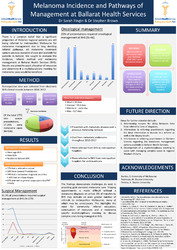Please use this identifier to cite or link to this item:
http://hdl.handle.net/11054/1431| Title: | Melanoma incidence and pathways of management at Ballarat Health Services. |
| Author: | Ringin, Sarah Brown, Stephen |
| Issue Date: | 2019 |
| Conference Name: | Medical Oncology Group of Australia: Annual Scientific Meeting |
| Conference Date: | 14 - 16 August |
| Conference Place: | Canberra |
| Abstract: | Background: There is a common belief that a significant proportion of Victorian regional patients are still being referred to metropolitan Melbourne for melanoma management due to long standing referral pathways. All melanoma treatment options are now standard of care and available for patients in Ballarat. We sought to evaluate the incidence, referral method and melanoma management at Ballarat Health Services (BHS). Results are aimed to assist allocation of resources and determine if a multidisciplinary meeting for melanoma cases would be beneficial. Method: Retrospective data was collected from electronic BHS clinical records between 2010-2017 capturing demographic and pathologic information. Analysed data demonstrated 1772 skin cancer presentations with 17.25% being melanoma cases. Results: Patients presenting to BHS with a melanoma had a median age of 66.5, 61% male and 69% resided in the Ballarat region. Only 77% of patients had a written referral, the majority from general practitioners (58%) with merely 74% diagnosed with a melanoma on arrival. The median time between referral without a diagnosis to a melanoma diagnosis was 44 days. Surgical management most commonly involved a wide local excision and 15% of presentations required oncological treatment at BHS. 6% of patients presented with metastatic disease post a previous melanoma removal and 12% of patients died from metastatic melanoma. BHS referred 3% of cases to metropolitan hospitals whilst 8% were referred to BHS from metropolitan hospitals for continued care. Conclusion: The findings demonstrate challenges do exist in providing gold standard melanoma care. Triaging appointments is made difficult without a melanoma diagnosis on arrival. 8% of transfers to BHS may indicate an even greater number of referrals to metropolitan Melbourne, many of which may be unnecessary. This highlights the need for community referral education, continuation of resources and a melanoma specific multidisciplinary meeting to discuss complex cases being managed at BHS. |
| URI: | http://hdl.handle.net/11054/1431 |
| Internal ID Number: | 01378 |
| Health Subject: | MELANOMA TREATMENT OPTIONS MELANOMA MANAGEMENT REFERRAL PATHWAYS MULTIDISCIPLINARY MEETINGS |
| Type: | Conference Poster |
| Appears in Collections: | Research Output |
Files in This Item:
| File | Description | Size | Format | |
|---|---|---|---|---|
| Melanoma Poster 2.pdf | Conference Poster | 878.43 kB | Adobe PDF |  View/Open |
Items in DSpace are protected by copyright, with all rights reserved, unless otherwise indicated.
